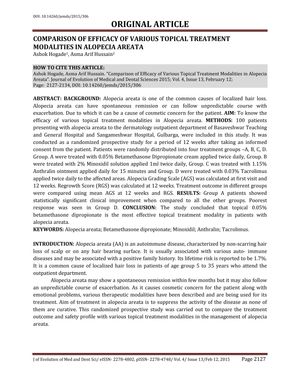Comparison of Efficacy of Various Topical Treatment Modalities in Alopecia Areata
February 2015
in “
Journal of evolution of medical and dental sciences
”

TLDR 0.05% Betamethasone Dipropionate is the most effective topical treatment for alopecia areata.
The study compared the efficacy of various topical treatments for alopecia areata in 100 patients over 12 weeks. Patients were divided into four groups: Group A (0.05% Betamethasone Dipropionate), Group B (2% Minoxidil), Group C (1.15% Anthralin), and Group D (0.03% Tacrolimus). Results showed that Group A had the most significant clinical improvement, while Group D had the poorest response. The study concluded that 0.05% Betamethasone Dipropionate was the most effective topical treatment for alopecia areata.









